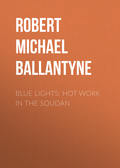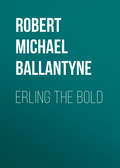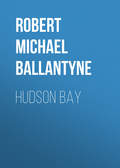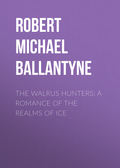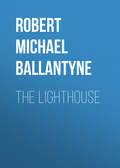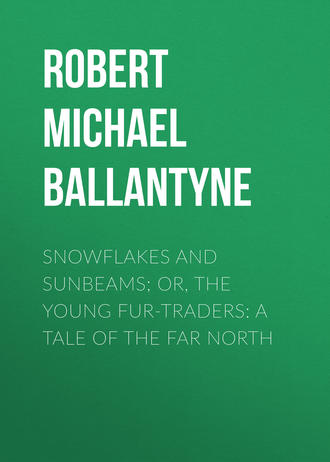
Robert Michael Ballantyne
Snowflakes and Sunbeams; Or, The Young Fur-traders: A Tale of the Far North
This last exclamation was elicited from Hamilton by a sharp blow caused by a branch which, catching on part of Harry's dress as he plodded on in front, suddenly rebounded and struck him across the face. This is of common occurrence in travelling through the woods, especially to those who from inexperience walk too closely on the heels of their companions.
"What's wrong now, Hammy?" inquired his friend, looking over his shoulder.
"Oh, nothing worth mentioning—rather a sharp blow from a branch, that's all."
"Well, proceed; you've interrupted yourself twice in what you were going to say. Perhaps it'll come out if you try it a third time."
"I was merely going to say that I don't much care where I am sent to, so long as it is not to an outpost where I shall be all alone."
"All very well, my friend; but seeing that outposts are, in comparison with principal forts, about a hundred to one, your chance of avoiding them is rather slight. However, our youth and want of experience is in our favour, as they like to send men who have seen some service to outposts. But I fear that, with such brilliant characters as you and I, Hammy, youth will only be an additional recommendation, and inexperience won't last long.—Hollo! what's going on yonder?"
Harry pointed as he spoke to an open spot in the woods about a quarter of a mile in advance, where a dark object was seen lying on the snow, writhing about, now coiling into a lump, and anon extending itself like a huge snake in agony.
As the two friends looked, a prolonged howl floated towards them.
"Something wrong with the dogs, I declare!" cried Harry.
"No doubt of it," replied his friend, hurrying forward, as they saw their Indian guide rise from the ground and flourish his whip energetically, while the howls rapidly increased.
A few minutes brought them to the scene of action, where they found the dogs engaged in a fight among themselves, and the driver, in a state of vehement passion, alternately belabouring and trying to separate them. Dogs in these regions, like the dogs of all other regions, we suppose, are very much addicted to fighting—a propensity which becomes extremely unpleasant if indulged while the animals are in harness, as they then become peculiarly savage, probably from their being unable, like an ill-assorted pair in wedlock, to cut or break the ties that bind them. Moreover, they twist the traces into such an ingeniously complicated mass that it renders disentanglement almost impossible, even after exhaustion has reduced them to obedience. Besides this, they are so absorbed in worrying each other that for the time they are utterly regardless of their driver's lash or voice. This naturally makes the driver angry, and sometimes irascible men practise shameful cruelties on the poor dogs. When the two friends came up they found the Indian glaring at the animals, as they fought and writhed in the snow, with every lineament of his swarthy face distorted with passion, and panting from his late exertions. Suddenly he threw himself on the dogs again, and lashed them furiously with the whip. Finding that this had no effect, he twined the lash round his hand, and struck them violently over their heads and snouts with the handle; then falling down on his knees, he caught the most savage of the animals by the throat, and seizing its nose between his teeth almost bit it off. The appalling yell that followed this cruel act seemed to subdue the dogs, for they ceased to fight, and crouched, whining, in the snow.
With a bound like a tiger young Hamilton sprang upon the guide, and seizing him by the throat, hurled him violently to the ground. "Scoundrel!" he cried, standing over the crestfallen Indian with flushed face and flashing eyes, "how dare you thus treat the creatures of God?"
The young man would have spoken more, but his indignation was so fierce that it could not find vent in words. For a moment he raised his fist, as if he meditated dashing the Indian again to the ground as he slowly arose; then, as if changing his mind, he seized him by the back of the neck, thrust him towards the panting dogs, and stood in silence over him with the whip grasped firmly in his hand, while he disentangled the traces.
This accomplished, Hamilton ordered him in a voice of suppressed anger to "go forward"—an order which the cowed guide promptly obeyed, and in a few minutes more the two friends were again alone.
"Hamilton, my boy," exclaimed Harry, who up to this moment seemed to have been petrified, "you have perfectly amazed me! I'm utterly bewildered."
"Indeed, I fear that I have been very violent," said Hamilton, blushing deeply.
"Violent!" exclaimed his friend. "Why, man, I've completely mistaken your character. I—I—"
"I hope not, Harry," said Hamilton, in a subdued tone; "I hope not. Believe me, I am not naturally violent. I should be very sorry were you to think so. Indeed, I never felt thus before, and now that it is over I am amazed at myself; but surely you'll admit that there was great provocation. Such terrible cruelty to—"
"My dear fellow, you quite misunderstand me. I'm amazed at your pluck, your energy. Soft indeed! we have been most egregiously mistaken. Provocation! I just think you had; my only sorrow is that you didn't give him a little more."
"Come, come, Harry; I see you would be as cruel to him as he was to the poor dog. But let us press forward; it is already growing dark, and we must not let the fellow out of sight ahead of us."
"Allons donc," cried Harry; and hastening their steps, they travelled silently and rapidly among the stems of the trees, while the shades of night gathered slowly round them.
That night the three travellers encamped in the snow under the shelter of a spreading pine. The encampment was formed almost exactly in a similar manner to that in which they had slept on the night of their exploits at North River. They talked less, however, than on that occasion, and slept more soundly. Before retiring to rest, and while Harry was extended, half asleep and half awake, on his green blanket, enjoying the delightful repose that follows a hard day's march and a good supper, Hamilton drew near to the Indian, who sat sullenly smoking a little apart from the young men. Sitting down beside him, he administered a long rebuke in a low, grave tone of voice. Like rebukes generally, it had the effect of making the visage of the Indian still more sullen. But the young man did not appear to notice this; he still continued to talk. As he went on, the look grew less and less sullen, until it faded entirely away, and was succeeded by that grave, quiet, respectful expression peculiar to the face of the North American Indian.
Day succeeded day, night followed night, and still found them plodding laboriously through the weary waste of snow, or encamping under the trees of the forest. The two friends went through all the varied stages of experience which are included in what is called "becoming used to the work," which is sometimes a modified meaning of the expression "used up." They started with a degree of vigour that one would have thought no amount of hard work could possibly abate. They became aware of the melancholy fact that fatigue unstrings the youngest and toughest sinews. They pressed on, however, from stern necessity, and found, to their delight, that young muscles recover their elasticity even in the midst of severe exertion. They still pressed on, and discovered, to their dismay, that this recovery was only temporary, and that the second state of exhaustion was infinitely worse than the first. Still they pressed on, and raised blisters on their feet and toes that caused them to limp wofully; then they learned that blisters break and take a long time to heal, and are much worse to walk upon during the healing process than they are at the commencement—at which time they innocently fancied that nothing could be more dreadful. Still they pressed on day after day, and found to their satisfaction that such things can be endured and overcome; that feet and toes can become hard like leather, that muscles can grow tough as india-rubber, and that spirits and energy can attain to a pitch of endurance which nothing within the compass of a day's march can by any possibility overcome. They found also, from experience, that their conversation changed, both in manner and subject, as they progressed on their journey. At first they conversed frequently and on various topics, chiefly on the probability of their being sent to pleasant places or the reverse. Then they spoke less frequently, and growled occasionally, as they advanced in the painful process of training. After that, as they began to get hardy, they talked of the trees, the snow, the ice, the tracks of wild animals they happened to cross, and the objects of nature generally that came under their observation. Then as their muscles hardened and their sinews grew tough, and the day's march at length became first a matter of indifference, and ultimately an absolute pleasure, they chatted cheerfully on any and every subject, or sang occasionally, when the sun shone out and cast an appearance of warmth across their path. Thus onward they pressed, without halt or stay, day after day, through wood and brake, over river and lake, on ice and on snow, for miles and miles together, through the great, uninhabited, frozen wilderness.
CHAPTER XXIV
Hopes and fears—An unexpected meeting—Philosophical talk between the hunter and the parson.
On arriving at Norway House, Harry Somerville and his friend Hamilton found that they were to remain at that establishment during an indefinite period of time, until it should please those in whose hands their ultimate destination lay to direct them how and where to proceed. This was an unlooked-for trial of their patience; but after the first exclamation of disappointment, they made up their minds, like wise men, to think no more about it, but bide their time, and make the most of present circumstances.
"You see," remarked Hamilton, as the two friends, after having had an audience of the gentleman in charge of the establishment, sauntered towards the rocks that overhang the margin of Playgreen Lake—"you see, it is of no use to fret about what we cannot possibly help. Nobody within three hundred miles of us knows where we are destined to spend next winter. Perhaps orders may come in a couple of weeks, perhaps in a couple of months, but they will certainly come at last. Anyhow, it is of no use thinking about it, so we had better forget it, and make the best of things as we find them."
"Ah!" exclaimed Harry, "your advice is, that we should by all means be happy, and if we can't be happy, be as happy as we can. Is that it?"
"Just so. That's it exactly."
"Ho! But then you see, Hammy, you're a philosopher and I'm not, and that makes all the difference. I'm not given to anticipating evil, but I cannot help dreading that they will send me to some lonely, swampy, out-of-the-way hole, where there will be no society, no shooting, no riding, no work even to speak of—nothing, in fact, but the miserable satisfaction of being styled 'bourgeois' by five or six men, wretched outcasts like myself."
"Come, Harry," cried Hamilton; "you are taking the very worst view of it. There certainly are plenty of such outposts in the country, but you know very well that young fellows like you are seldom sent to such places."
"I don't know that," interrupted Harry. "There's young M'Andrew: he was sent to an outpost up the Mackenzie his second year in the service, where he was all but starved, and had to live for about two weeks on boiled parchment. Then there's poor Forrester: he was shipped off to a place—the name of which I never could remember—somewhere between the head-waters of the Athabasca Lake and the North Pole. To be sure, he had good shooting, I'm told, but he had only four labouring men to enjoy it with; and he has been there ten years now, and he has more than once had to scrape the rocks of that detestable stuff called tripe de roche to keep himself alive. And then there's–"
"Very true," interrupted Hamilton. "Then there's your friend Charles Kennedy, whom you so often talk about, and many other young fellows we know, who have been sent to the Saskatchewan, and to the Columbia, and to Athabasca, and to a host of other capital places, where they have enough of society—male society, at least—and good sport."
The young men had climbed a rocky eminence which commanded a view of the lake on the one side, and the fort, with its background of woods, on the other. Here they sat down on a stone, and continued for some time to admire the scene in silence.
"Yes," said Harry, resuming the thread of discourse, "you are right: we have a good chance of seeing some pleasant parts of the country. But suspense is not pleasant. O man, if they would only send me up the Saskatchewan River! I've set my heart upon going there. I'm quite sure it's the very best place in the whole country."
"You've told the truth that time, master," said a deep voice behind them.
The young men turned quickly round. Close beside them, and leaning composedly on a long Indian fowling-piece, stood a tall, broad-shouldered, sun-burned man, apparently about forty years of age. He was dressed in the usual leathern hunting-coat, cloth leggings, fur cap, mittens, and moccasins that constitute the winter garb of a hunter; and had a grave, firm, but good-humoured expression of countenance.
"You've told the truth that time, master," he repeated, without moving from his place. "The Saskatchewan is, to my mind, the best place in the whole country; and havin' seen a considerable deal o' places in my time, I can speak from experience."
"Indeed, friend," said Harry, "I'm glad to hear you say so. Come, sit down beside us, and let's hear something about it."
Thus invited, the hunter seated himself on a stone and laid his gun on the hollow of his left arm.
"First of all, friend," continued Harry, "do you belong to the fort here?"
"No," replied the man, "I'm staying here just now, but I don't belong to the place."
"Where do you come from then, and what's your name?"
"Why, I've comed d'rect from the Saskatchewan with a packet o' letters. I'm payin' a visit to the missionary village yonder"—the hunter pointed as he spoke across the lake—"and when the ice breaks up I shall get a canoe and return again."
"And your name?"
"Why, I've got four or five names. Somehow or other people have given me a nickname wherever I ha' chanced to go. But my true name, and the one I hail by just now, is Jacques Caradoc."
"Jacques Caradoc!" exclaimed Harry, starting with surprise. "You knew a
Charley Kennedy in the Saskatchewan, did you?"
"That did I. As fine a lad as ever pulled a trigger."
"Give us your hand, friend," exclaimed Harry, springing forward, and seizing the hunter's large, hard fist in both hands. "Why, man, Charley is my dearest friend, and I had a letter from him some time ago in which he speaks of you, and says you're one of the best fellows he ever met."
"You don't say so," replied the hunter, returning Harry's grasp warmly, while his eyes sparkled with pleasure, and a quiet smile played at the corner of his mouth.
"Yes I do," said Harry; "and I'm very nearly as glad to meet with you, friend Jacques, as I would be to meet with him. But come; it's cold work talking here. Let's go to my room; there's a fire in the stove.—Come along, Hammy;" and taking his new friend by the arm, he hurried him along to his quarters in the fort.
Just as they were passing under the fort gate, a large mass of snow became detached from a housetop and fell heavily at their feet, passing within an inch of Hamilton's nose. The young man started back with an exclamation, and became very red in the face.
"Hollo!" cried Harry, laughing, "got a fright, Hammy! That went so close to your chin that it almost saved you the trouble of shaving."
"Yes; I got a little fright from the suddenness of it," said Hamilton quietly.
"What do you think of my friend there?" said Harry to Jacques, in a low voice, pointing to Hamilton, who walked on in advance.
"I've not seen much of him, master," replied the hunter. "Had I been asked the same question about the same lad twenty years agone, I should ha' said he was soft, and perhaps chicken-hearted. But I've learned from experience to judge better than I used to do. I niver thinks o' forming an opinion o' anyone till I geen them called to sudden action. It's astonishin' how some faint-hearted men will come to face a danger and put on an awful look o' courage if they only get warnin', but take them by surprise—that's the way to try them."
"Well, Jacques, that is the very reason why I ask your opinion of
Hamilton. He was pretty well taken by surprise that time, I think."
"True, master; but that kind of start don't prove much. Hows'ever, I don't think he's easy upset. He does look uncommon soft, and his face grew red when the snow fell, but his eyebrow and his under lip showed that it wasn't from fear."
During that afternoon and the greater part of that night the three friends continued in close conversation—Harry sitting in front of the stove, with his hands in his pockets, on a chair tilted as usual on its hind legs, and pouring out volleys of questions, which were pithily answered by the good-humoured, loquacious hunter, who sat behind the stove, resting his elbows on his knees, and smoking his much-loved pipe; while Hamilton reclined on Harry's bed, and listened with eager avidity to anecdotes and stories, which seemed, like the narrator's pipe, to be inexhaustible.
"Good-night, Jacques, good-night," said Harry, as the latter rose at last to depart; "I'm delighted to have had a talk with you. You must come back to-morrow. I want to hear more about your friend Redfeather. Where did you say you left him?"
"In the Saskatchewan, master. He said that he would wait there, as he'd heerd the missionary was comin' up to pay the Injins a visit."
"By-the-by, you're going over to the missionary's place to-morrow, are you not?"
"Yes, I am."
"Ah, then, that'll do. I'll go over with you. How far off is it?"
"Three miles or thereabouts."
"Very good. Call in here as you pass, and my friend Hamilton and I will accompany you. Good-night."
Jacques thrust his pipe into his bosom, held out his horny hand, and giving his young friends a hearty shake, turned and strode from the room.
On the following day Jacques called according to promise, and the three friends set off together to visit the Indian village. This missionary station was under the management of a Wesleyan clergyman, Pastor Conway by name, an excellent man, of about forty-five years of age, with an energetic mind and body, a bald head, a mild, expressive countenance, and a robust constitution. He was admirably qualified for his position, having a natural aptitude for every sort of work that man is usually called on to perform. His chief care was for the instruction of the Indians, whom he had induced to settle around him, in the great and all-important truths of Christianity. He invented an alphabet, and taught them to write and read their own language. He commenced the laborious task of translating the Scriptures into the Cree language; and being an excellent musician, he instructed his converts to sing in parts the psalms and Wesleyan hymns, many of which are exceedingly beautiful. A school was also established and a church built under his superintendence, so that the natives assembled in an orderly way in a commodious sanctuary every Sabbath day to worship God; while the children were instructed, not only in the Scriptures, and made familiar with the narrative of the humiliation and exaltation of our blessed Saviour, but were also taught the elementary branches of a secular education. But good Pastor Conway's energy did not stop here. Nature had gifted him with that peculiar genius which is powerfully expressed in the term "a jack-of-all-trades." He could turn his hand to anything; and being, as we have said, an energetic man, he did turn his hand to almost everything. If anything happened to get broken, the pastor could either "mend it himself or direct how it was to be done. If a house was to be built for a new family of red men, who had never handled a saw or hammer in their lives, and had lived up to that time in tents, the pastor lent a hand to begin it, drew out the plan (not a very complicated thing certainly), set them fairly at work, and kept his eye on it until it was finished. In short, the worthy pastor was everything to everybody, "that by all means he might gain some."
Under such management the village flourished as a matter of course, although it did not increase very rapidly owing to the almost unconquerable aversion of North American Indians to take up a settled habitation.
It was to this little hamlet, then, that our three friends directed their steps. On arriving, they found Pastor Conway in a sort of workshop, giving directions to an Indian who stood with a soldering-iron in one hand and a sheet of tin in the other, which he was about to apply to a curious-looking half-finished machine that bore some resemblance to a canoe.
"Ah, my friend Jacques!" he exclaimed as the hunter approached him, "the very man I wished to see. But I beg pardon, gentlemen,-strangers, I perceive. You are heartily welcome. It is seldom that I have the pleasure of seeing new friends in my wild dwelling. Pray come with me to my house."
Pastor Conway shook hands with Harry and Hamilton with a degree of warmth that evinced the sincerity of his words. The young men thanked him and accepted the invitation.
As they turned to quit the workshop, the pastor observed Jacques's eye fixed with a puzzled expression of countenance, on his canoe.
"You have never seen anything like that before, I daresay?" said he, with a smile.
"No, sir; I never did see such a queer machine afore."
"It is a tin canoe, with which I hope to pass through many miles of country this spring, on my way to visit a tribe of Northern Indians, and it was about this very thing that I wanted to see you, my friend."
Jacques made no reply, but cast a look savouring very slightly of contempt on the unfinished canoe as they turned and went away.
The pastor's dwelling stood at one end of the village, a view of which it commanded from the back windows, while those in front overlooked the lake. It was pleasantly situated and pleasantly tenanted, for the pastor's wife was a cheerful, active little lady, like-minded with himself, and delighted to receive and entertain strangers. To her care Mr. Conway consigned the young men, after spending a short time in conversation with them; and then, requesting his wife to show them through the village, he took Jacques by the arm and sauntered out.
"Come with me, Jacques," he began; "I have somewhat to say to you. I had not time to broach the subject when I met you at the Company's fort, and have been anxious to see you ever since. You tell me that you have met with my friend Redfeather."
"Yes, sir; I spent a week or two with him last fall I found him stayin' with his tribe, and we started to come down here together."
"Ah, that is the very point," exclaimed the pastor, "that I wish to inquire about. I firmly believe that God has opened that Indian's eyes to see the truth; and I fully expected from what he said when we last met, that he would have made up his mind to come and stay here."
"As to what the Almighty has done to him," said Jacques, in a reverential tone of voice, "I don't pretend to know; he did for sartin speak, and act too, in a way that I never seed an Injin do before. But about his comin' here, sir, you were quite right: he did mean to come, and I've no doubt will come yet."
"What prevented him coming with you, as you tell me he intended?" inquired the pastor.
"Well, you see, sir, he and I and his squaw, as I said, set off to come here together: but when we got the length o' Edmonton House, we heerd that you were comin' up to pay a visit to the tribe to which Redfeather belongs; and so seem' that it was o' no use to come down hereaway just to turn about an' go up agin, he stopped there to wait for you, for he knew you would want him to interpret—"
"Ay," interrupted the pastor, "that's true. I have two reasons for wishing to have him here. The primary one is, that he may get good to his immortal soul; and then he understands English so well that I want him to become my interpreter; for although I understand the Cree language pretty well now, I find it exceedingly difficult to explain the doctrines of the Bible to my people in it. But pardon me, I interrupted you."
"I was only going to say," resumed Jacques, "that I made up my mind to stay with him; but they wanted a man to bring the winter packet here, so, as they pressed me very hard, an' I had nothin' particular to do, I 'greed and came, though I would rather ha' stopped; for Redfeather an' I ha' struck up a friendship togither—a thing that I would never ha' thought it poss'ble for me to do with a red Injin."
"And why not with a red Indian, friend?" inquired the pastor, while a shade of sadness passed over his mild features, as if unpleasant thoughts had been roused by the hunter's speech.
"Well, it's not easy to say why," rejoined the other. "I've no partic'lar objection to the red-skins. There's only one man among them that I bears a grudge agin, and even that one I'd rayther avoid than otherwise."
"But you should forgive him, Jacques. The Bible tells us not only to bear our enemies no grudge, but to love them and to do them good."
The hunter's brow darkened. "That's impossible, sir," he said; "I couldn't do him a good turn if I was to try ever so hard. He may bless his stars that I don't want to do him mischief; but to love him, it's jist imposs'ble."
"With man it is impossible, but with God all things are possible," said the pastor solemnly.
Jacques's naturally philosophic though untutored mind saw the force of this. He felt that God, who had formed his soul, his body, and the wonderfully complicated machinery and objects of nature, which were patent to his observant and reflective mind wherever he went, must of necessity be equally able to alter, influence, and remould them all according to His will. Common-sense was sufficient to teach him this; and the bold hunter exhibited no ordinary amount of common-sense in admitting the fact at once, although in the case under discussion (the loving of his enemy) it seemed utterly impossible to his feelings and experience. The frown, therefore, passed from his brow, while he said respectfully, "What you say, sir, is true; I believe though I can't feel it. But I s'pose the reason I niver felt much drawn to the red-skins is, that all the time I lived in the settlements I was used to hear them called and treated as thievin' dogs, an 'when I com'd among them I didn't see much to alter my opinion. Here an' there I have found one or two honest Injins, an' Redfeather is as true as steel; but the most o' them are no better than they should be. I s'pose I don' think much o' them just because they are red-skins."
"Ah, Jacques, you will excuse me if I say that there is not much sense in that reason. An Indian cannot help being a red man any more than you can help being a white one, so that he ought not to be despised on that account. Besides, God made him what he is, and to despise the work of God, or to undervalue it, is to despise God Himself. You may indeed despise, or rather abhor, the sins that red men are guilty of; but if you despise them on this ground, you must much more despise white men, for they are guilty of greater iniquities than Indians are. They have more knowledge, and are therefore more inexcusable when they sin; and anyone who has travelled much must be aware that, in regard to general wickedness, white men are at least quite as bad as Indians. Depend upon it, Jacques, that there will be Indians found in heaven at the last day as well as white men. God is no respecter of persons."
"I niver thought much on that subject afore, sir," returned the hunter; "what you say seems reasonable enough. I'm sure an' sartin, any way, that if there's a red-skin in heaven at all, Redfeather will be there, an' I only hope that I may be there too to keep him company."
"I hope so, my friend,", said the pastor earnestly; "I hope so too, with all my heart. And if you will accept of this little book, it will show you how to get there."
The missionary drew a small, plainly-bound copy of the Bible from his pocket as he spoke, and presented it to Jacques, who received it with a smile, and thanked him, saying, at the same time, that he "was not much up to book-larnin', but he would read it with pleasure."
"Now, Jacques," said the pastor, after a little further conversation on the subject of the Bible, in which he endeavoured to impress upon him the absolute necessity of being acquainted with the blessed truths which it contains—"now, Jacques, about my visit to the Indians. I intend, if the Almighty spares me, to embark in yon tin canoe that you found me engaged with, and, with six men to work it, proceed to the country of the Knisteneux Indians, visit their chief camp, and preach to them there as long as the weather will permit. When the season is pretty well advanced, and winter threatens to cut off my retreat, I shall re-embark in my canoe and return home. By this means I hope to be able to sow the good seed of Christian truths in the hearts of men who, as they will not come to this settlement, have no chance of being brought under the power of the Gospel by any other means."
Jacques gave one of his quiet smiles on hearing this. "Right sir—right," he said, with some energy; "I have always thought, although I niver made bold to say it before, that there was not enough o' this sort o' thing. It has always seemed to me a kind o' madness (excuse my plainness o' speech, sir) in you pastors, thinkin' to make the red-skins come and settle round you like so many squaws, and dig up an' grub at the ground, when it's quite clear that their natur' and the natur' o' things about them meant them to be hunters. An' surely, since the Almighty made them hunters, He intended them to be hunters, an' won't refuse to make them Christians on that account. A red-skin's natur' is a huntin' natur', an' nothin' on arth 'll ever make it anything else.'



